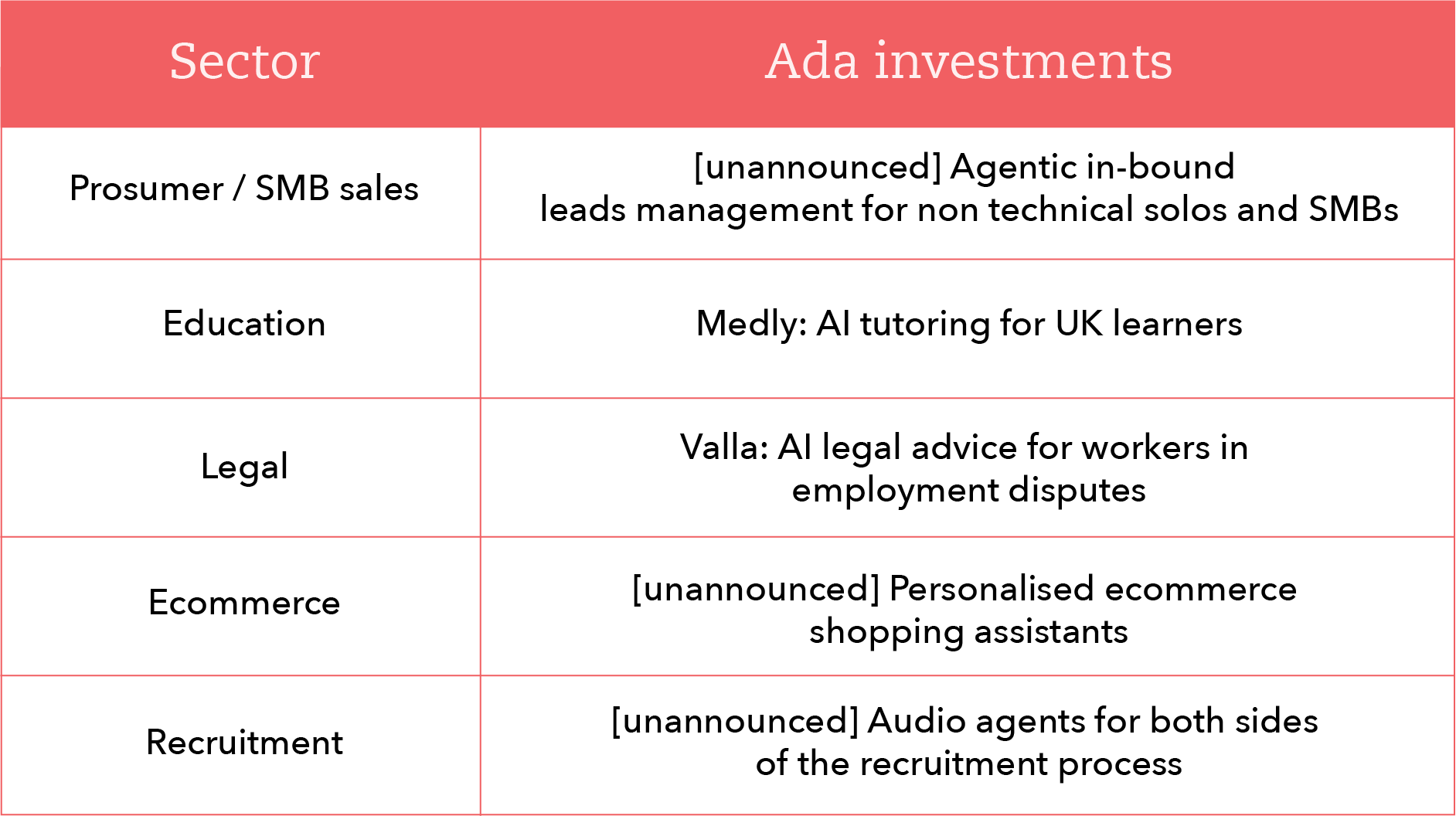🎉 The Inclusive Alpha Founder Report is live!
Read now


AI has supercharged investment in B2B tech. From DataRobot to Quantexa, VCs worldwide have poured their money into startups building tools for businesses. That trend shows no signs of slowing down, but another one is starting up.
No, I’m not talking about those D2C ice cream startups VCs rushed to fund during the 2020–21 consumer boom. What’s happening now is different.
AI is starting to impact individual consumers in their daily lives. From education, where AI tools are rapidly reshaping how people learn, to mental and physical health, shopping, and even banking. Consumer AI is catching fire, and it’s spreading faster and more deeply here than in the corporate world, where contradictory policies and regulatory red tape can often act as a handbrake on adoption.
Historically too, the largest outcomes - those elusive outlier VC fund-returners - are companies that successfully predict and capture the zeitgeist, constantly evolving to meet consumers’ changing tastes and demands. Amazon, Meta, Google and Apple are all predominantly consumer or ‘prosumer’ businesses that built massive enterprise offerings later in their journeys. To me the hardest, most elusive aspect of this job is predicting what customers will want in 1 to 3 years’ time. Get this right, and your LPs will love you forever.
In our own portfolio, companies like Gizmo and Medly have shown how well-built, effective consumer AI can capture enormous market share and scale exponentially. Having previously backed a range of consumer startups like Bubble and Customuse, we’ve been deploying capital into the consumer/prosumer AI adoption trend at a rapid clip of late. Examples of some of our recent, unannounced investments include:

The future of consumer AI is exciting to us, but there are a couple of core technical challenges which need ironing out if the tech is to reach its full potential.
Take AI voice assistants, for example. We’ve come a long way since the early days of Siri, but the vast majority of these tools only really respond to rigid, command-based input. The tech struggles to pick up and analyse information from more fluid exchanges, with no real capacity to engage in ‘human’ conversation. This makes the user experience far more robotic, and products feel more like a hands-free search engine than a true digital assistant.
Another challenge for voice AI is its continued difficulties with personalisation. While your AI assistant might know your name or which football team you support, its ability to recognise and respond to your tone of voice, emotional state or preferred style of communication is essentially non-existent. User-tech interactions are limited to the same basic parameters, regardless of circumstance.
The problems with voice assistants are linked to another, more fundamental issue with consumer AI: memory. The reason AI tools of all kinds only offer fairly superficial interactions is because they are, as yet, unable to retain enough contextual information to have real ‘conversations’. Put simply, beyond the prompts you’ve used previously, the AI doesn’t really remember you.
To try and overcome some of these limitations, we’re looking closely at supplementary AI techniques such as neurosymbolic AI. With better memory, deeper context, and a capacity to ‘understand’ users, we can shift these products from tool to companion. That switch could reshape everything from how we manage our health and wellbeing to how we handle our money. Here are three areas I expect to see transformed by the next wave of AI innovation:
The growth of apps like Strava and Runna have shown the enormous consumer appetite for tools that allow users to track their own training and progress. But while the existing tech is no doubt impressive, AI has the potential to revolutionise this market. A shift that could take the offering from generic digital fitness plans to a personal trainer in your pocket.
Some platforms have already started integrating AI into their products (see Strava’s Athlete Intelligence), but these upgrades have so far been limited to pretty basic ‘post-workout’ features that only respond to data you’ve already recorded, giving fairly simplistic insights.
What comes next could unlock a new level of tailored support and guidance. Imagine a live training partner on your phone, setting and amending goals by interacting with you and responding to real-time indicators. An AI companion that takes everything into account: your mood, recent training history, how many hours you spent at work, or even the weather. All the things that any good human coach would think about before designing and delivering a session. This is where AI has the power to take fitness tech from plain and generic to genuinely transformative.
We all know healthtech is booming. And while the sector might seem crowded, there’s still room for truly groundbreaking innovators to shake up the B2C market. Key to cracking open this sector is building products that offer a genuinely personalised and, crucially, holistic approach to digital healthcare.
Right now the major players in this industry are focussed on tracking or addressing individual aspects of a users’ health. Think Flo for women’s health, ZOE for gut health, Oura Rings for sleep, and so on. Each of these tools has helped to improve the overall remote healthcare offering, but the onus is still on users to seek out, download, buy and manage these products separately.
AI gives us the chance to change this. A woman who wants to monitor her menstrual cycle, improve her gut health and get better sleep, shouldn’t have to juggle 10 different subscriptions or manage an assortment of apps to keep on top of her wellbeing. Instead, imagine a tool that allows you to do all of this through one user-friendly app. One that delivers genuinely tailored, 360° insights and support. By rectifying the core memory issues at the heart of incumbent AI, we can make this a reality.
As with fitness and healthcare, most consumer fintech tools remain fairly limited in scope. Some products (hello, Cleo) are starting to show what AI-powered consumer finance might look like, but they’re still fundamentally tied to the same old model of analysing historical data and delivering broad-strokes advice.
The next generation will go further. By building AI that can understand and retain much richer context and engage in truly ‘human’ interactions, we can move beyond these rigid templates. Again, the challenge here is to evolve the offering from simple tracking tools to forward-looking, bespoke advice.
Just like an AI-powered personal trainer, it doesn't take much to imagine a world where we’re all consulting handheld financial advisors. With the right tech behind them, they could consider everything from your employment status and living arrangements to lifestyle choices and long-term goals, and then offer tailored guidance on what to do with your money.
At Ada, we want to support the founders building industry-defining tech that will deliver genuine impact for consumers.
In line with our updated framework for investing in AI – and alongside our climate equity, healthy ageing and economic empowerment theses – we see the coming wave of AI innovation as an unmissable opportunity to both drive change and significant returns.
So, if you’re building something exciting in any of the areas mentioned above, please get in touch. We’d love to hear how you’re meeting these challenges head on to deliver truly personalised AI.